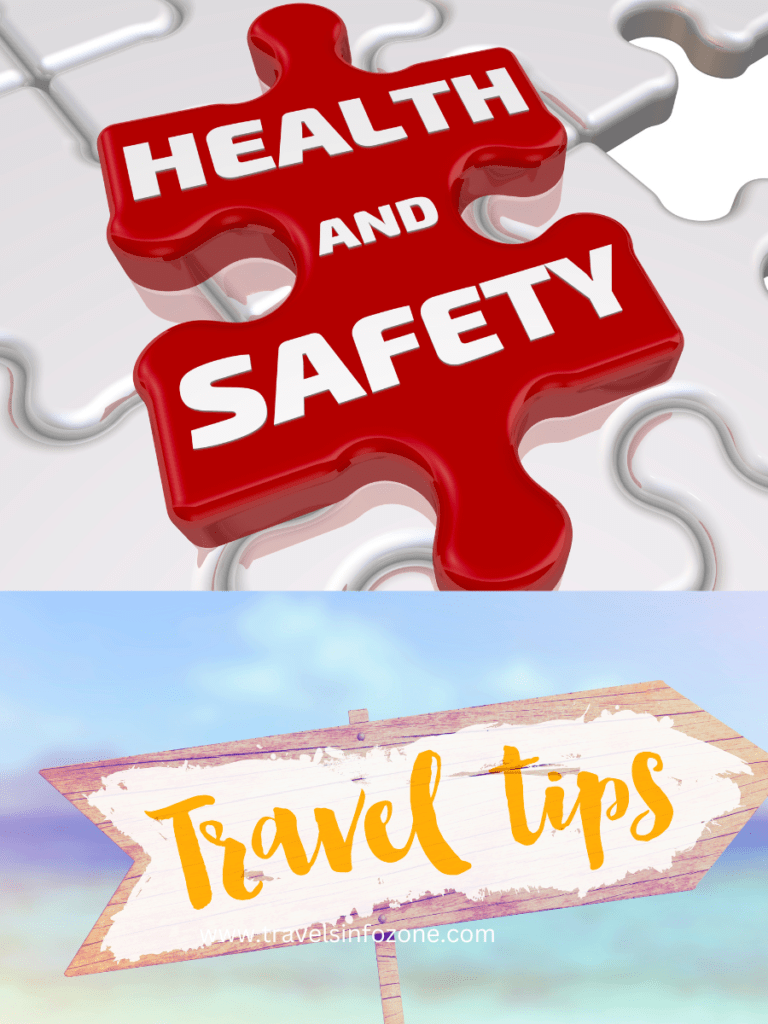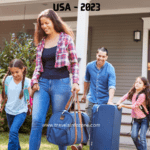
Health and Safety Tips for Traveling in 2023
1. Pre-Travel Preparation:
- Check the travel advisories and entry requirements.
- Ensure passports and visas are up-to-date.
- Research destination-specific health guidelines.
- Arrange travel insurance with medical coverage.
- Share your itinerary and contacts with your family. For essential travel tips, just click.
2. Vaccination and boosters:
- Stay updated on COVID-19 vaccines.
- Get booster shots as recommended.
- Consider other relevant vaccines.
- Carry vaccination records when traveling.
- Check the destination’s vaccine requirements.
- Face masks and hand sanitizers
- Disinfectant wipes for surfaces
- Digital copies of travel documents
- Personal medication and first-aid kit.
- Extra masks and sanitation supplies
4. Safe Air Travel:
- Wear masks during the flight.
- Use air vents to improve ventilation.
- Practice hand hygiene on the plane.
- Avoid touching your face.
- Limit movement within the cabin.
5. Accommodation Safety:
- Research the lodging’s hygiene protocols.
- Disinfect high-touch surfaces.
- Choose contactless check-in options.
- Ventilate rooms by opening windows.
- Use your own bedding if possible.
6. Dining and Food Safety:
- Opt for outdoor or well-ventilated dining.
- Sanitize your hands before and after eating.
- Choose reputable, clean restaurants.
- Consider takeout or room service.
- Be cautious with shared utensils.
7. Public Transportation:
- Maintain physical distance on buses and trains.
- Use hand sanitizer after touching surfaces.
- Follow mask mandates in transit.
- Consider private transportation options.
- Avoid crowded rush hours.
8. Health Monitoring:
- Stay informed about local COVID-19 cases.
- Monitor your health daily.
- Know the COVID-19 testing locations.
- Isolate if feeling unwell.
- Seek medical help if necessary.
9. Cultural Sensitivity:
- Respect local health regulations.
- Follow mask mandates and distancing.
- Be aware of cultural norms.
- Learn essential local phrases.
- Adapt to changing guidelines.
10. Flexibility and contingency plans:
- Prepare for potential itinerary changes.
- Have a backup lodging plan.
- Know the nearest healthcare facilities.
- Stay updated on travel news. Connect to the travel news portal.
- Stay flexible and patient throughout your trip.
11. Travel Insurance Coverage:
- Review your travel insurance policy.
- Ensure it covers COVID-19-related issues.
- Check cancellation and trip interruption coverage.
- Understand the claims process.
- Carry copies of your insurance details.
12. Local Healthcare Resources:
- Research nearby hospitals and clinics.
- Note emergency contact numbers.
- Identify English-speaking facilities.
- Make a list of allergies and conditions.
- Understand your insurance’s medical network.
13. Hydration and Nutrition:
- Stay hydrated, especially in warm climates.
- Choose bottled or purified water.
- Eat balanced, cooked meals.
- Avoid street food in uncertain conditions.
- Carry healthy snacks for on-the-go.
14. Outdoor Adventure Safety:
- Use appropriate safety gear.
- Follow park regulations and guidelines.
- Check weather forecasts before activities.
- Inform someone of your outdoor plans.
- Carry essential emergency supplies.
15. Children and Family Travel:
16. Communication and Connectivity:
- Have a reliable mobile plan.
- Install translation apps if needed.
- Share your location with trusted contacts.
- Keep emergency contact numbers accessible.
- Consider a portable charger for devices.
17. Currency and Payment Methods:
- Carry a mix of payment options.
- Inform your bank about your travel plans.
- Use contactless payments when possible.
- Be cautious with ATMs.
- Keep emergency cash in a secure location.
18. Avoid Crowds and Peak Times:
- Plan activities during off-peak hours.
- Visit popular sites early or late.
- Research less-crowded attractions.
- Stay updated on local restrictions.
- Maintain physical distance in crowded areas.
19. Post-Travel Health Monitoring:
- Continue monitoring your health.
- Look for COVID-19 symptoms.
- Consider post-travel testing.
- Isolate yourself if you develop symptoms.
- Follow your home country’s guidelines.
20. Responsible Tourism Practices:
- Respect local ecosystems and wildlife.
- Dispose of waste properly.
- Support sustainable tourism initiatives.
- Choose eco-friendly transportation.
- Educate yourself on cultural norms and customs.


